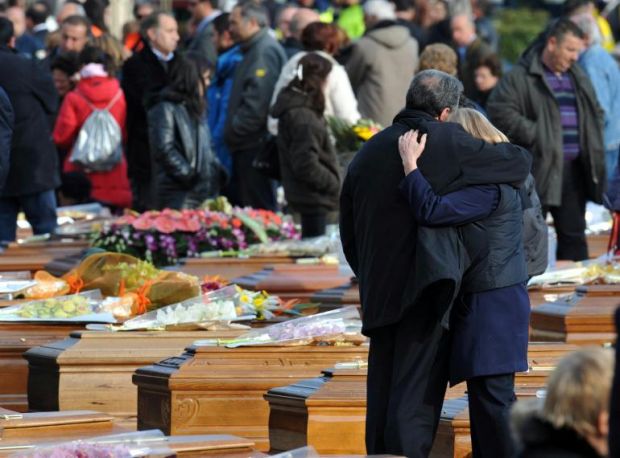The World Political Forum – OVERCOMING NUCLEAR DANGER
La redazione
Cambridge (USA), 4-5 December 2007 The World Political Forum OVERCOMING NUCLEAR DANGER Cambridge (USA), 4-5 December 2007 Tuesday, 4 December 6:00 pm to 7:30 pm Opening Forum at Harvard's John F. Kennedy School of Government Presenter: President Gorbachev, former President of USSR, President of The World Political Forum Moderator: Graham Allison, Douglas Dillon Professor of […]
OVERCOMING NUCLEAR DANGER
Cambridge (USA), 4-5 December 2007
Tuesday, 4 December
6:00 pm to 7:30 pm
Opening Forum at Harvard's John F. Kennedy School of Government
Presenter: President Gorbachev, former President of USSR, President of The World Political Forum
Moderator: Graham Allison, Douglas Dillon Professor of Government and Director of the Belfer
Center for Science and International Affairs at Harvard University
Topic: "Overcoming Nuclear Danger."
Wednesday, 5 December
Four Conference Sessions – John F. Kennedy School of Government
8:30 am to 10:00 am
I. The 1987 INF Treaty: zeroing out a class of nuclear weapons and missiles. A look back at the concept of the INF agreement and the record of what it achieved for lessons or insights about extensions or analogs.
Discussion Initiator: Rose Gottemoeller, Director of Carnegie Moscow Center, expert in non-proliferation, U.S.-Russian relations and U.S. national security
Moderators: Steven Miller, Director, International Security Program; Editor-in-Chief, International Security and Alexander Konovalov, President of the Institute for Strategic Assessments
Discussion Questions:
· What was the basic concept in the INF agreement?
· Twenty years on, what grade should an objective observer give this agreement?
· Is the verification regime that allowed the parties to "trust but verify" appropriate for agreements that constrain the arms of the U.S., Russia, or other states appropriate today?
· Is it possible to expand the INF Treaty to include more nations or more types of missiles or weapons?
· How will interactions between missiles, on the one hand, and missile defenses, on the other, affect the feasibility of the INF Treaty and other analogs?
10:20 to 11:50
II. Reykjavik. In 1986 at Reykjavik, Iceland, Presidents Reagan and Gorbachev had what each thought was a serious discussion of eliminating all nuclear weapons. This session will focus on the thinking behind this discussion, how the idea came about, why it was not adopted, and whether it may be more appropriate and/or more feasible today.
Discussion Initiator: President Gorbachev, former President of the USSR, President of The World Political Forum
Discussion Participant: Secretary George Shultz (by video link), former US Secretary of State
Moderator: Joe Nye, University Distinguished Service Profesor and Sultan of Oman Professor of International Relations at Harvard University's Kennedy School of Government
Discussion Questions:
· How serious were both Presidents about eliminating all nuclear weapons?
· Is the complete elimination of nuclear weapons a realistic goal?
· Would the elimination of nuclear weapons make the world safer and more stable?
· Can the elimination of nuclear weapons be achieved separately from agreements about missiles and missile defense?
1:00 to 2:30
III. Nuclear Danger Today: Nuclear Terrorism. This session will ask (1) how grave is the threat of nuclear terrorism and (2) what actions can be taken to minimize this danger?
Discussion Initiator: Graham Allison, Douglas Dillon Professor of Government and Director of the Belfer Center for Science and International Affairs at Harvard University
Moderators: Mikhail Margelov, Russian Senator, Chairman of the Committee for Foreign Affairs and Tad Oelstrom, Director of the National Security Program, John F. Kennedy School of Government
Discussion Questions:
· How real is the threat of terrorists exploding a nuclear weapon in one of our cities?
· Whose cities are at greatest risk of nuclear terrorism?
· What are the most important and urgent actions that can be taken to combat this threat?
3:00 to 4:30
IV. Beyond START II and the Treaty of Moscow. The future of U.S.-Russian strategic arms control.
Discussion Initiator: Alexander Bessmertnykh, former Minister for Foreign Affairs of USSR
Moderator: Matt Bunn, Senior Research Associate, Managing the Atom Project
Discussion Questions:
· What challenges to stability will be posed by the expiration of the strategic arms control verification regime in 2009?
· What agreements beyond START II and the Moscow Treaty would enhance U.S., Russian, and global security and stability?
· How do missile defenses affect the balance in arms control and disarmament negotiations?
PER MAGGIORI INFO: WWW.THEWORLDPOLITICALFORUM.ORG






